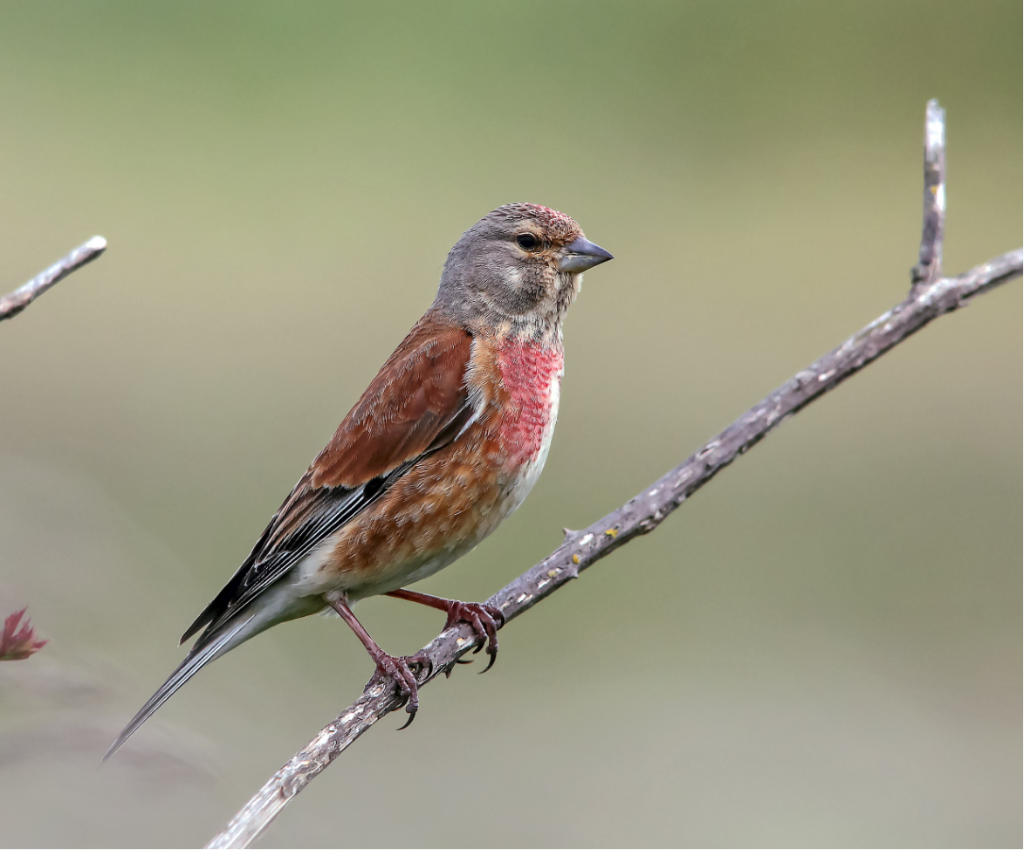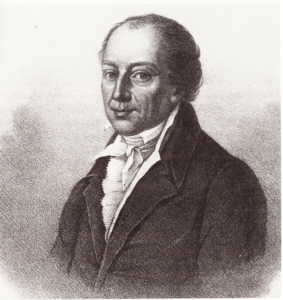The linnet's declaration of love
(Poet's title: Hänflings Liebeswerbung)
Set by Schubert:
D 552
[April 1817]
Ahidi! ich liebe.
Mild lächelt die Sonne,
Mild wehen die Weste,
Sanft rieselt die Quelle,
Süß duften die Blumen!
Ich liebe, Ahidi!
Ahidi! ich liebe.
Dich lieb ich, du Sanfte
Mit seidnem Gefieder,
Mit strahlenden Äuglein,
Dich, Schönste der Schwestern!
Ich liebe, Ahidi!
Ahidi! ich liebe.
O sieh, wie die Blumen
Sich liebevoll grüßen,
Sich liebevoll nicken!
O liebe mich wieder!
Ich liebe, Ahidi!
Ahidi! ich liebe.
O sieh, wie der Efeu
Mit liebenden Armen
Die Eiche umschlinget.
O liebe mich wieder!
Ich liebe, Ahidi!
Ahidi! I am in love.
The sun is smiling gently,
The west winds are blowing gently,
The spring is burbling softly,
The flowers are emitting sweet scent.
I am in love, Ahidi!
Ahidi! I am in love.
I love you. You are so soft
With your silken feathers.
With your glowing little eyes,
I love you, the most beautiful of the sisters!
I am in love, Ahidi!
Ahidi! I am in love.
Oh look at the flowers
Greeting each other so full of love,
Nodding to each other so full of love!
Oh, love me in return!
I am in love, Ahidi!
Ahidi! I am in love.
Oh look at the ivy
With its loving arms
Embracing the oak tree.
Oh, love me in return!
I am in love, Ahidi!
All translations into English that appear on this website, unless otherwise stated, are by Malcolm Wren. You are free to use them on condition that you acknowledge Malcolm Wren as the translator and schubertsong.uk as the source. Unless otherwise stated, the comments and essays that appear after the texts and translations are by Malcolm Wren and are © Copyright.
☙
Themes and images in this text:
Arms and embracing Birds East and West Eyes Feathers and plumage Flowers Greetings Ivy Oak trees Silk Smells Songs (general) Springs, sources and fountains The sun Sweetness Wind
This poem was first published in Kind’s novella about the life, deeds and opinions of his linnet, Leben, Thaten und Meinungen meines Hänflings von ihm selbst erzählt, published in Leipzig in 1794. Ahidi is the name of the linnet’s beloved and we are expected to assume that the male linnet’s famous song is a declaration of love (even though more recent ornithological research suggests that it is more to do with defending territory).
The bird looks around at blossoming nature and begs the female linnet to love him in return, just as the flowers nod greetings to each other in the wind and as the ivy embraces the oak. Perhaps we should not try to imagine the mechanics of linnets embracing and just accept that the bird wants some sign of mutual affection.


☙
William Wordsworth, The Tables Turned
Up! up! my Friend, and quit your books;
Or surely you’ll grow double:
Up! up! my Friend, and clear your looks;
Why all this toil and trouble?
The sun above the mountain’s head,
A freshening lustre mellow
Through all the long green fields has spread,
His first sweet evening yellow.
Books! ’tis a dull and endless strife:
Come, hear the woodland linnet,
How sweet his music! on my life,
There’s more of wisdom in it.
Robert Bridges, I heard a linnet courting
I heard a linnet courting
His lady in the spring:
His mates were idly sporting,
Nor stayed to hear him sing
His song of love.–
I fear my speech distorting
His tender love.
The phrases of his pleading
Were full of young delight;
And she that gave him heeding
Interpreted aright
His gay, sweet notes,–
So sadly marred in the reading,–
His tender notes.
And when he ceased, the hearer
Awaited the refrain,
Till swiftly perching nearer
He sang his song again,
His pretty song:–
Would that my verse spake clearer
His tender song!
Ye happy, airy creatures!
That in the merry spring
Think not of what misfeatures
Or cares the year may bring;
But unto love
Resign your simple natures,
To tender love.
☙
Confirmed by Peter Rastl with Schubert’s source, Fridrich Kind’s Gedichte. Neueste Auflage. Wien 1815. Bey B. Ph. Bauer pages 120-121; and with Gedichte von Friedrich Kind. Leipzig bei Johann Friedrich Hartknoch 1808, pages 132-133.
First published in Kind’s novella Leben, Thaten und Meinungen meines Hänflings von ihm selbst erzählt, anonymously published in Lenardos Schwærmereyen. Zweiter Theil. Leipzig bey Wilhelm Heinsius dem jüngern 1794. The poem appears in chapter 5 of the novella, pages 93-94.
To see an early edition of the text, go to page 120 [124 von 244] here: http://digital.onb.ac.at/OnbViewer/viewer.faces?doc=ABO_%2BZ204819301


